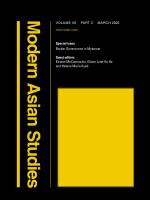Border governance in Myanmar
This special issue explores borderlands and bordering processes in Myanmar, from an empirical and theoretical perspective. We argue that borders are central to politics and the governance of people, goods, and territories, not only as markers of territorial-administrative control, but also as practices that shape the dynamics of inclusion and exclusion, (im)mobility, and relations of power and authority. Myanmar is particularly relevant for discussing how political governance is shaped by bordering processes, not least in relation to ethnicity and territory. We adopt the concept of ‘border governance’, to explore the governance in, of and through borderlands.
The contributions to this special issue were written prior to the military coup on 1 February 2021. It emerged from a critical concern that Myanmar’s politics in the ‘transitional phase’ (2010-2020) were being approached through an analytical and policy lens that underestimated the importance of the country’s borderlands. Rather we argue in the special issue that borders and borderlands are vitally important to understanding Myanmar’s political past, present, and future and that myriad negotiations of borders are necessary for a genuine political transition. The articles in the issue bring to view the physical territories at the edge of the state as well as the bordering processes that create international and internal borders, exemplified physically, symbolically, and in embodied ways through the identities inscribed on particular ethnic or religious groups.
The border governance approach presented in this special issue highlights the continued centrality of ethnicity in Myanmar’s politics, and the role of racialized hierarchies as bordering processes in peacebuilding as well as in conflict. Prospects for lasting peace in Myanmar are closely linked to understanding these identities and correcting the inequalities and oppression that have defined center-borderland relations for so many years. These lines of enquiry and argument are even more urgent in the context of the military coup and its aftermath. As the popular resistance and opposition are struggling to break free from military rule, they are also challenging ethnic boundaries, Burmese nationalism, and territorial-administrative centralization.
The special issue features an introduction by the editors, Kirsten McConnachie, Elaine Lynn-Ee Ho and Helene Maria Kyed. This is followed by seven articles by a group of Myanmar as well as non-Myanmar scholars. Some of the articles explore how residents of ethnic border states, like Rakhine, Karen, Chin and Kachin, experience and navigate institutional pluralism and the bordering processes of state and non-state authorities. Others illuminate how political changes, peace negotiations, elections, and interventions by the central state and international agencies have affected governance in the borderlands.
DIIS Experts



